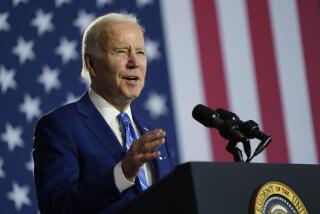Obama steps up efforts to help young men of color
- Share via
WASHINGTON — President Obama will launch an initiative aimed at improving the lives of young black and Latino men by bringing businesses and foundations together with government agencies to change what an administration official called the “school-to-prison pipeline.”
Obama plans to unveil the initiative, called My Brother’s Keeper, on Thursday. The move is the latest in a series of efforts by the president to spur social change outside the stalemated legislative process, and represents an escalation of his efforts to target the problems faced by young men of color.
Obama has met privately with minority youth in their communities and at the White House. But in his State of the Union speech last month, he pledged to go further, saying he would bring more of his resources as president to bear on the social problems that block their success.
“I’m reaching out to some of America’s leading foundations and corporations on a new initiative to help more young men of color facing tough odds stay on track and reach their full potential,” he said.
The initiative will probably include changes to government policies that create undue barriers to opportunity, said an administration official who asked not to be identified in order to discuss the proposal before the president announced it.
As an example of the kinds of actions that might be involved, the official pointed to recent guidelines the departments of Education and Justice sent to school districts to prompt them to change “zero tolerance” discipline policies. Those policies, aimed at potentially disruptive behavior, have had a disproportionately harsh impact on minority students, particularly boys, the two departments said.
But much of the initiative is expected to focus on private-sector activities, with the White House as a catalyst.
Obama is expected to appear with other prominent black and Latino men to talk about how businesses and foundations can work together to help children arrive at school ready to learn and stay away from criminal activity.
In addition to encouraging corporations to contribute to training and education programs, the president hopes to help build partnerships between businesses and grass-roots organizations working with at-risk youth.
The campaign is meant to create a range of programs that deal with such challenges as literacy, early learning and efforts to help young men find jobs and career opportunities, the administration official said.
The president is expected to announce corporate donations to help fund the campaign, along with a federal effort to refocus resources on programs that have proven effective at helping minority youth.
Republican elected officials, faith leaders and corporate executives are among those who have been working on this project for the last several months, aides said.
Several young men and boys are expected to be present for Obama’s announcement, among them participants of the Chicago-based group Becoming a Man, a support group for teens that the president visited on a trip to his home city last year.
In his first term, Obama was cautious about discussing race-specific problems, preferring to address issues of disparity in terms of economics. He ventured a few comments about problems facing young black men in America, at one point noting that Trayvon Martin, an unarmed Florida teenager shot to death while walking home, could have been his son.
But when the president met with young black men to talk about the risks they face, he did so privately. Last year, after a session with Becoming a Man at a high school in Chicago, he started talking with White House staff about how to galvanize efforts to help such youth get educations, find meaningful work and build stable lives.
Obama wanted to be able to make government programs more effective, said Michael Strautmanis, a former aide who was at the Chicago meeting and worked on related projects during the president’s first term.
But Obama also wanted to recruit businesses and nonprofits to work together, Strautmanis said, in hopes of inspiring more sweeping change.
“He has always talked in terms of creating something sustainable — something that has impact,” Strautmanis said. “A real economic effort — now that requires the private sector.”
More to Read
Sign up for Essential California
The most important California stories and recommendations in your inbox every morning.
You may occasionally receive promotional content from the Los Angeles Times.







